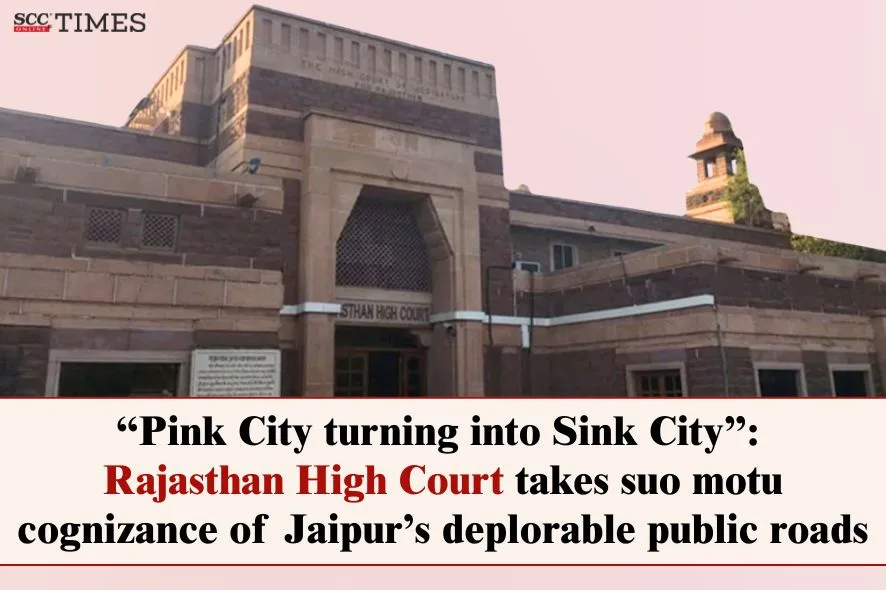Rajasthan High Court: While taking suo moto cognizance based on various news items highlighting the deplorable conditions of public roads in Jaipur City and treating the news reports as Public Interest Litigation (‘PIL’), the Single-Judge Bench of Pramil Kumar Mathur, J., observing that the road situation violates Article 21 and disregards the responsibility of the State to protect its cultural and architectural wealth under Article 49 of the Constitution issued directions to State authorities for undertaking survey of roads and charting out an action plan within 4 weeks indicating time-line for repairs and improvements.
The court noted that Jaipur, a UNESCO World Heritage City holds immense cultural and architectural significance attracting substantial number of domestic and international tourists thereby making the city streets not merely transport routes, but corridors of living heritage boarded by iconic havelis, palaces, markets and temples dating back to the 18th Century. The poor state of infrastructure undermines Pink City’s image globally, in result, discouraging tourism and impacting social livelihood dependent on tourism economy.
The court observed that the crumbling and potholed roads with lack of proper drainage are dangerous for pedestrians, commuters, and tourists, especially during the monsoon season when the drainage system fails, leading to waterlogging and traffic chaos. The Court further observed that despite repeated complaints by residents and media coverage, the authorities have failed to take timely and durable actions to repair and maintain these roads, leading to repeated accidents, traffic chaos, water logging and erosion of heritage structures. This inaction of the concerned authorities is not only endangering public safety but is also severely tarnishing the international image of Jaipur as a well-planned and heritage protected city in violation of Article 21 of the Constitution which guarantees the Right to Life and Livelihood with Dignity. The Court noted that despite allocation of substantial public funds for road development and maintenance, the ground reality reflects serious concerns of mismanagement, negligence and possible malpractices.
The Court noted that roads constructed using crores of taxpayer money get damaged within a day due to poor material quality and construction, being handed over without adhering to the standard quality checklists and enforcing the Defect Liability Period (“DLP”), with officers and contractors escaping liability and tenders being awarded continuously to habitual offenders. Further there is lack of coordination between Jaipur Development Authority (‘JDA’), Municipal Corporation agencies and various departments leading to repeated digging of roads.
The Court observed that,
“the failure to maintain basic civic infrastructure, especially in heritage precincts, violates Article 21 of the Constitution of India (Right to Safe Living Conditions) and Article 49 of the Constitution of India (Protection of Monuments of National Importance) along with the directive principles under Article 47 and 48-A of the Constitution of India. Moreover, this act of negligence hampers Article 19(1)(d) of the Constitution which guarantees all the citizens the right to move freely throughout the territory of India. The pathetic conditions of roads severely restrict access and movement, infringing upon this fundamental right.”
The court noted that in State of H.P. v. Umed Ram Sharma, (1986) 2 SCC 68, the Supreme Court had held that there should be road for communication in reasonable conditions in view of the Constitutional imperatives and denial of that right would be denial of the life as understood in its richness and fullness by the ambit of the Constitution. To the residents of the hilly areas as far as feasible and possible society has constitutional obligation to provide roads for communication.
The Court noted that it is high time to contemplate that will Jaipur remain the proud Pink City known for its beauty and heritage or turn into a sink city that crumbles under its own infrastructural problem. The failure to maintain roads, which is a basic civic duty, results in daily hardships, accidents, and sometimes loss of life.
In light of the afore-stated reasons, the court issued notices to the Chief Secretary of Rajasthan, Principal Secretary of the Urban Development and Housing Department, Commissioner of the Jaipur Development Authority (JDA), and Commissioners of the Municipal Councils of Jaipur Greater and Heritage, issuing the following directions:
- The State Government, through the JDA and Municipal Corporations, is directed to undertake a survey of roads and submit a report within two weeks.
- The concerned authorities shall file an action plan within four weeks indicating a timeline for repairs and improvements.
- They must also submit a comprehensive affidavit within four weeks explaining the current conditions of roads, steps for upgradation in heritage zones, a scheme to tackle waterlogging, and information on corrective and punitive measures.
- The affidavit must also name individuals accountable for sub-standard materials, failure to comply with technical specifications, and approving bills without proper inspections.
- The court directed the Registry to treat the matter as a Public Interest Litigation and appointed senior advocates to assist the court.
-
The order is to be published in the media to enable public and heritage conservation experts to submit their inputs.
[In Re: Jaipur (Public Roads and its Corrective Modes), 2025 SCC OnLine Raj 3711, decided on 30-07-2025]



